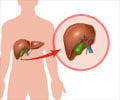US scientists have found a way to block replication of the hepatitis C virus, potentially leading to better treatment for the top cause of liver cancer in the United States.
US scientists have discovered a way to block replication of the hepatitis C virus, potentially leading to better treatment for the top cause of liver cancer in the United States, a study said Wednesday.
In vitro experiments identified a protein that is essential to the reproductive cycle of the hepatitis C virus (HCV), the researchers said.An altered synthetic version of the protein was found to destroy the virus' ability to replicate, they added.
The altered protein led to compounds that prevented the aggregation or replication of HCV virus, said study lead author Jeffrey Glenn, a professor of gastroenterology and hepatology, and director of Stanford University's Center for Hepatitis and Liver Tissue Engineering.
Because the compounds operate by disrupting a mechanism that is only needed by the virus, the researchers hope any new drugs developed from their research will be less toxic for humans.
Glenn foresees a year to 18 months of preclinical and animal testing before the Food and Drug Administration (FDA) can approve the class of compounds for clinical trials in humans.
The study was published Wednesday in the online edition of Science Translational Medicine.
Advertisement
At present, the only hepatitis treatment approved by the US Food and Drug Administration is a cocktail of interferon and ribavirin, which is toxic, must be administered in a 48-week course and is effective in less than half of patients.
Advertisement
According to the World Health Organization (WHO), 170 million people worldwide are infected with hepatitis C, which is transmitted via blood and can progress over years into cirrhosis and liver cancer.
There are an estimated four million carriers of the virus in Europe, and between three and four million people in the United States are chronically infected, according to the WHO.
Source-AFP
THK














